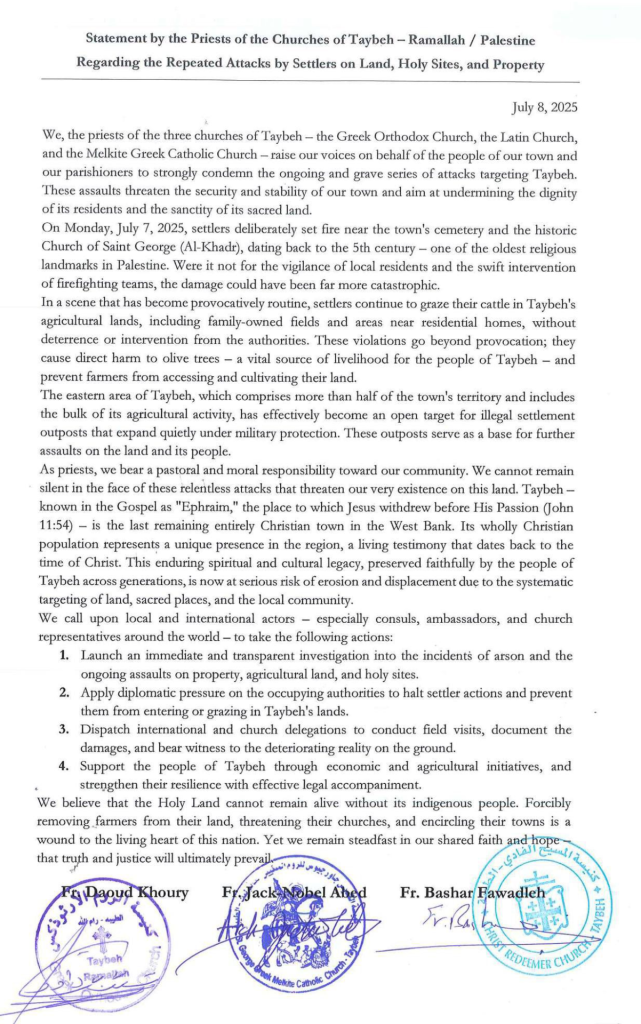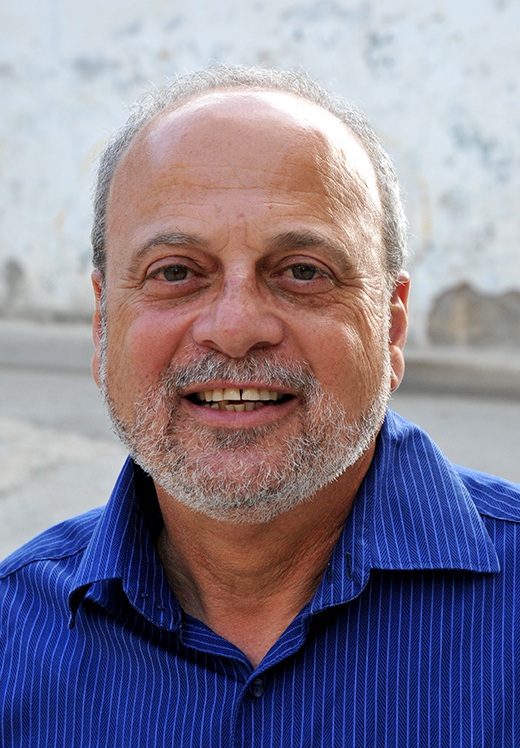
Previous Priests in Taybeh Condemn Escalating Settler Attacks on Palestinian Christian Town

By Salim J. Munayer
Since the recent escalation in tensions between the Israel–U.S. bloc and Iran, I have often heard in social gatherings that this conflict is a religious war. Attempts to offer an alternative perspective are frequently met with anger or outright dismissal. However, I would like to present a different view—one shared by many scholars and analysts—arguing that what we are witnessing is not primarily a religious conflict but a struggle for regional and global hegemony. I will also offer some biblical insights to help frame this understanding.
Contrary to popular narratives, the wars and conflicts in the Middle East are not fundamentally religious. While religious and sectarian rhetoric is often invoked by political actors, the core struggle is about power, resources, and strategic dominance. The region is enmeshed in a contest for hegemony among global powers, regional players, and ideological blocs, all vying to shape its future.
Religion is often used more as a political instrument than as a root cause. Take, for example, the Sunni–Shia divide. This theological difference is frequently manipulated by states like Saudi Arabia and Iran to justify their geopolitical ambitions. Yet the rivalry is driven less by doctrine and more by power projection, strategic alliances, and the pursuit of regional influence.
Similarly, the conflicts in Syria, Yemen, Iraq, and in our settler-colonial context cannot be reduced to a religious binary of Islam, Judaism, or Christianity. These are complex struggles over land, sovereignty, national identity, and access to resources. While religion may appear in the discourse, it is rarely the true engine of conflict.
Global powers such as the United States, Russia, and China are deeply involved in the region, not to protect religious beliefs but to secure energy routes, arms markets, and geopolitical leverage. The U.S. has supported both authoritarian regimes and rebel factions, depending on its shifting interests. Russia intervenes to protect its allies and strategic assets. China, meanwhile, invests in long-term economic gain. Regional powers, including Turkey, Israel, Iran, and the Gulf states, continuously maneuver for dominance in this volatile landscape. This helps explain, to a certain extent, the complicity of Western powers in the genocide unfolding in Gaza.
What we are witnessing, then, is not a clash of religions but a competition among empires. The language of faith may serve to mobilize populations or legitimize violence, but the deeper reality is one of competing visions of power, order, and control. Recognizing this is crucial if we are to pursue a just and lasting peace in the Middle East.
Understanding this dynamic allows us to see through simplistic slogans that frame the West as “Christian” and the East as “Islamic.” It helps us discern how religion and religious language are often cynically deployed by global powers to serve political and economic agendas.
From a biblical perspective, Jesus did not ignore the political realities of His time. Living under Roman occupation, He directly addressed the nature of political power. While He acknowledged the legitimacy of state authority—“Give to Caesar what is Caesar’s, and to God what is God’s” (Mark 12:17), thus affirming a distinction between political and divine authority—He also proclaimed the Kingdom of God, a radical counter-vision to imperial claims of ultimate rule (cf. Luke 4:18–19; Matthew 5–7).
The Apostle Paul, writing within the context of the Roman Empire, instructed believers to respect governing authorities (Romans 13:1 -7), recognizing their role in maintaining order and justice. Yet his repeated declaration that “Jesus is Lord” (Philippians 2:11) was deeply subversive in a society where Caesar demanded that very title. This suggests a nuanced posture: civic engagement coupled with a prophetic challenge to unjust power.
In light of this, Christians are called to resist simplistic narratives that fuel division and to seek a deeper understanding of the forces shaping our world. Peace and justice in the Middle East will not come through religious slogans, but through truth, discernment, and a commitment to confronting injustice in all its forms—political, economic, and spiritual.
*************************************************
Professor Dr. Salim J. Munayer is the founder of Musalaha, an organization dedicated to fostering reconciliation between Palestinians and Israelis and other divided communities in the Middle East. He served for several years as Academic Dean at Bethlehem Bible College and has authored several theological books focusing on theology, reconciliation, and justice. Professor Munayer currently serves as the Coordinator for the MENA region for the Peace and Reconciliation Network (PRN) of the World Evangelical Alliance (WEA)


تكافح مجلة “ملح الأرض” من أجل الاستمرار في نشر تقارير تعرض أحوال المسيحيين العرب في الأردن وفلسطين ومناطق الجليل، ونحرص على تقديم مواضيع تزوّد قراءنا بمعلومات مفيدة لهم ، بالاعتماد على مصادر موثوقة، كما تركّز معظم اهتمامها على البحث عن التحديات التي تواجه المكون المسيحي في بلادنا، لنبقى كما نحن دائماً صوت مسيحي وطني حر يحترم رجال الدين وكنائسنا ولكن يرفض احتكار الحقيقة ويبحث عنها تماشيًا مع قول السيد المسيح و تعرفون الحق والحق يحرركم
من مبادئنا حرية التعبير للعلمانيين بصورة تكميلية لرأي الإكليروس الذي نحترمه. كما نؤيد بدون خجل الدعوة الكتابية للمساواة في أمور هامة مثل الإرث للمسيحيين وأهمية التوعية وتقديم النصح للمقبلين على الزواج وندعم العمل الاجتماعي ونشطاء المجتمع المدني المسيحيين و نحاول أن نسلط الضوء على قصص النجاح غير ناسيين من هم بحاجة للمساعدة الإنسانية والصحية والنفسية وغيرها.
والسبيل الوحيد للخروج من هذا الوضع هو بالتواصل والنقاش الحر، حول هويّاتنا وحول التغييرات التي نريدها في مجتمعاتنا، من أجل أن نفهم بشكل أفضل القوى التي تؤثّر في مجتمعاتنا،.
تستمر ملح الأرض في تشكيل مساحة افتراضية تُطرح فيها الأفكار بحرّية لتشكل ملاذاً مؤقتاً لنا بينما تبقى المساحات الحقيقية في ساحاتنا وشوارعنا بعيدة المنال.
كل مساهماتكم تُدفع لكتّابنا، وهم شباب وشابات يتحدّون المخاطر ليرووا قصصنا.